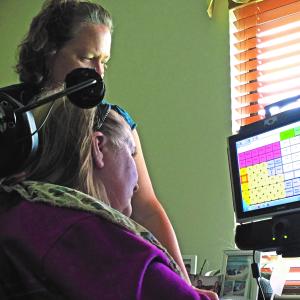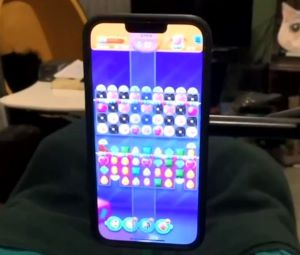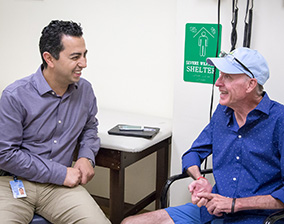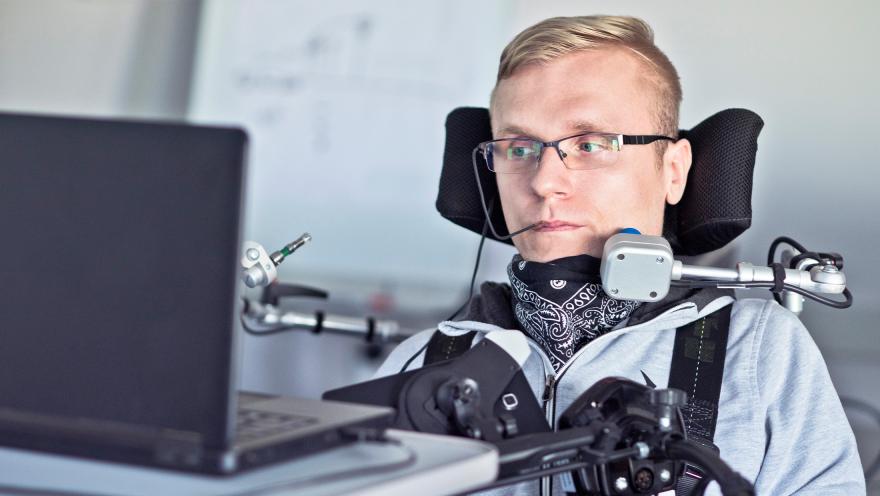Video games have come a long way since Atari produced Pong, the first home console game, in 1975. Today it would seem there are games to suit every interest under the sun, many times over, for people of all ages. The release of the latest version of a popular game is an event in and of itself.

For people living with ALS, the enjoyment and escape video games may have once brought is far too often another thing the disease takes from them. As muscles weaken and fine motor functions decrease, handling video game controllers and keeping up with fast-paced game play can cause frustration and cause people to give up on gaming all together.
But a team of academics and researchers from Australia is exploring how people with ALS (or MND, as it commonly known in Australia) can still take part in and enjoy gaming. The team presented some of their early findings at the International Alliance of ALS/MND Association meeting in late 2022.
Dr. Kirsten Harley is a sociologist with the Centre for Disability Research and Policy at the University of Sydney who lives with ALS/MND and is part of the research team. Before she was diagnosed in 2013, video games had been an enjoyable part of her life. “When I had time. I chilled out by playing a variety of puzzle games on my iPad or a computer, and my mom, sisters and I enjoyed connecting by playing online Scrabble,” she said.
Kirsten increasingly found this part of her life taken away from her as the disease progressed. “As my arms grew weaker, I needed armrests, cradling my arms to use a computer keyboard and found it easier to manipulate an iPad on my lap. With increasing difficulty moving my hands I transitioned to a smaller tablet, and then phone, and abandoned games which required speed,” she said. “Finally, I became unable to even tap or swipe the screen. For a while I settled on giving suggestions as my husband and young daughter created fabulous worlds in Minecraft. Or I shared the fun problem solving and appreciated the gorgeous design in a hands-free way, as our family bonded during collective games of Monument Valley.”

Kirsten’s experiences are not unique, as the team found through their scoping review of what work has been done in field of gaming accessibility for people with conditions like ALS/MND. “While the identified research has largely focused on the ways people living with (ALS/MND) can interface with the games, we have also found that there is no single solution that will work for everyone,” said Dr. Matthew Harrison of the University of Melbourne, another member of the research team. “The key is to provide choice and agency in how people play.”
So while there is work being done to find ways to make gaming more accessible, the team found that sometimes they might not always be asking the right people the right questions. “Common characteristics that the studies included were user-driven approaches, technology like BCI (brain computer interfaces), eye tracking, head mounded display, auditory, keyboard, or tablet,” said team member Dr. Natasha Dwyer of Victoria University.“(They studied) games that were considered enjoyable, fun and easy to play by the research team writing the paper, but as my colleague Kirsten points out, perhaps not from the perspective of the person playing the game.”
Or to put it another way, “often the games used in the studies were what we call dead boring. So old-fashioned games like tic-tac toe, when there's a lot more innovative options available to people,” Tasha said.
By detailing what efforts are already being made for people with ALS/MND in the area of video game access, the research team hopes to allow the ALS/MND community to find the best avenues to advocate for the resources they need to enjoy gaming. “Being involved in awareness raising activities, such as sharing stories and participating in social media, forums, conferences, and events about experiences with games may also help,” they suggest. “(Caregiver) support for people living with ALS/MND to participate in awareness raising activities is really important, too.”

There are also resources within a ALS/MND multidisciplinary care team that can lend their talents and problem-solving skills to the challenges at hand. “Asking a speech pathologist or occupational therapist about what might help to play games at home, perhaps after having read some of the community guides, forums and advice on games, could help find useful changes to existing smartphones, consoles and computers,” team member Dr. Ben O’Mara of the Centre for Social Impact, University of New South Wales, and the Information Resources Manager at MND Australia, said.
Going forward, the team hopes through the efforts of the entire ALS/MND community across an increasingly interconnected world, more advances in both software and hardware can be found. Similar to how progress in ALS research builds on the work others have done, if developers and advocates can share and build on the work of each other, we can get to place where a person with ALS/MND anywhere in the world can enjoy the video games they love. As an example, Kristen now uses NeuroNode technology to play games on her phone, allowing her to once again play games instead of just watching.
When facing ALS/MND, the need to face the day-to-day, real world challenges the disease brings will always be a priority. But living with ALS/MND also means finding a way to enjoy the things that make us, well, us. “Gaming or game play is for everyone—play is inherently part of being human, and being able to feel the satisfaction of solving a puzzle or creating something, just helps us to feel fulfilled,” the teams said. “For some people, playing games as part of daily life helps them continue a fun activity they did before being diagnosed (with) ALS/MND, and is part of their identity—being a ‘gamer.’ Finding ways to play games can be a process of discovery and self-exploration about what is possible while living with ALS/MND.”
Over the coming months, we will continue to share more about the ongoing worldwide progress taking place in ALS research, care and advocacy in our series “ALS Around the Globe.” We hope you will follow along and share with your family and friends.
To learn more about the work being done by the Australian research team, listen to our Connecting ALS podcast episode, Making Video Games Accessible for People Living with ALS.
To continue to follow stories about people living with ALS in the community and learn more about the disease, subscribe to receive our weekly blogs in your inbox HERE or follow us at als.org/blog.


Join the conversation. Please comment below.